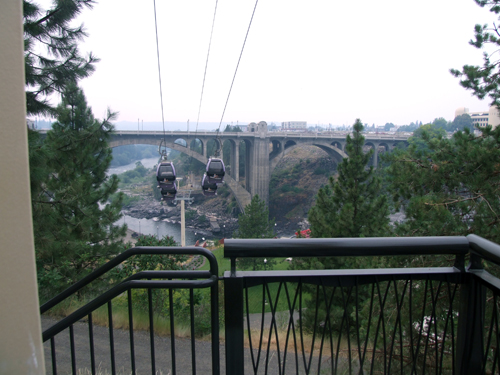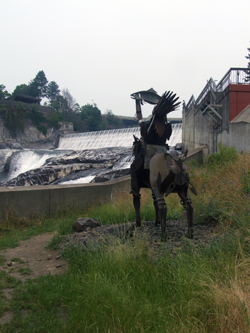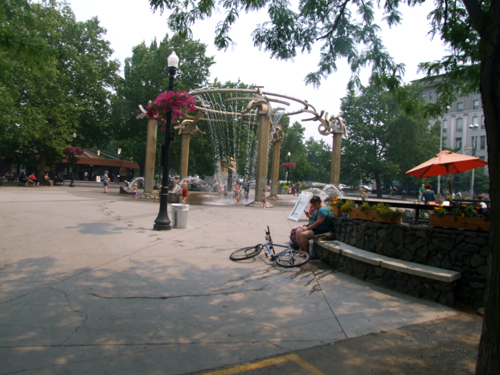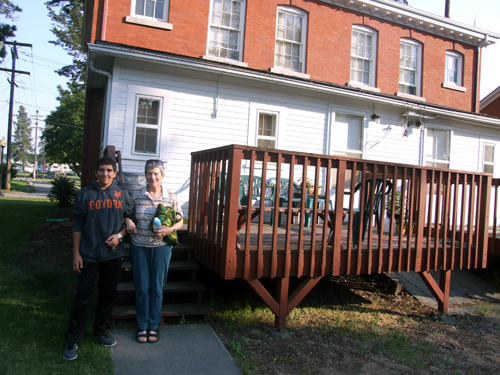
-Eighteenth in a Series–
By Donald H. Harrison


SPOKANE, Washington – During an all-too-short visit with grandson Shor to this eastern Washington city, I sensed that the civic leadership of Spokane values the city’s diversity and attempts to promote inter-group harmony.
From a vantage point for viewing Spokane Falls, for example, Shor and I noticed that a well-situated plaque retells a Spokane Indian legend about a coyote that fell in love with the daughter of a chief. In days when animals and people could communicate, the coyote told the chief he wanted to marry his daughter, and the chief refused, saying that animals and humans do not marry each other.
After some unsuccessful attempts to persuade the chief, the frustrated and angry coyote used its powers to build up the rocks on the Spokane River, fashioning the waterfall and also creating an insurmountable barrier for the salmon that needed to swim upstream to spawn.
“From that time the salmon were gone from the Spokane River and all its tributaries forever,” read the plaque. Nearby there was a larger than life metal statue of “Chief Salmon” astride his horse and holding a salmon above his head, while gazing at the falls.
Upstream from these lower Spokane Falls is the 100-acre Riverfront Park in the heart of downtown. Forty years ago, this was the site of Expo ’74, the environmentally themed World’s Fair held in Spokane. Today, a five-story clock tower built for the 1902 train depot on Havermale Island juts up from the grounds over such attractions as the 1909 Loof Carousel (imported to the Expo ’74 Fairgrounds), an IMAX theatre, ice skating rink, aerial gondola ride over the falls, and a “spray” ground offering relief from the summer heat.


Sculpted images representing “Bloomsday” race participants—runners who gather in the park every May—were sculpted by David Govedare. Known collectively as “The Joy of Running Together,” the imposing set of sculptures include runners of many descriptions including a participant in a wheel chair, in another nod toward inclusiveness.
Leopold Bloom, it should be recalled, was the Jewish-to-Catholic convert who was the protagonist in the James Joyce novel Ulysses. Bloomsday celebrations, in which people dress as characters in the novel and visit the sites in Dublin described by Joyce, are an annual event in Ireland, with tribute events, such as that in Spokane, held all over the world.
Expo ’74 was opened by Richard Nixon during the height of the Watergate Scandal, with hecklers yelling “Jail to the Chief,” according to the guidebook Visit Spokane: Near Nature. Near Perfect.
Shor and I also visited Mukogawa Fort Wright Institute, a 72-acre former U.S. Army (and later Air Force) fort that since 1990 has been used as a home-away-from-home for female Japanese college students who want to learn more about the English language and American culture. It is a branch of Mukogawa Women’s University in Nishinomiya, Japan.
The 19th Century Army general for whom the fort was named was a far cry from a multi-culturalist – George Wright not only fought the local Indians, but he also executed their leaders and even their horses. However, the fort’s reputation among minorities subsequently improved, particularly in the late 19th and early 20th century when it became home to Company M of the 24th Infantry Regiment, whose African American members had served in the Spanish American War.
The story is told that predominantly white Spokane was hostile to the black soldiers, but that through their musicianship – they played at concerts and at civic events – the soldiers turned the sentiment of the town around. On April 8, 1911, President Theodore Roosevelt came to the fort to review the troops, causing quite a bit of civic excitement.
One of the teachers of English as a second language at Mukogawa Fort Wright Institute is Pamela Pollack Fremd, the sister of Mimi Pollack, a Grossmont College ESL teacher who writes occasional columns for San Diego Jewish World. Pamela invited her brother, Edward, who until his retirement taught ESL at Eastern Washington University in nearby Cheney, Washington, and us for dinner at her house which is on the grounds of the Mukegawa Fort Wright Institute. Cheney, incidentally, is pronounced “Chee-knee,” and not “Chay-nay” like our former U.S. Vice President Dick Cheney.

The conversation, which was further enlivened by the presence of Edward and Pamela’s grown niece from Mexico City, Marcela Roel, ranged over such topics as travel, history, and Jewish affairs, and continued by telephone even after Shor and I left Spokane.
Edward Pollack agreed with my observation that Spokane’s civic leadership promotes inter-group harmony. In part, he said, that came about as a reaction to the establishment by white racist Richard Butler in nearby Hayden Lake, Idaho, of the Aryan Nations compound, which preached “Christian identity” and neo-Nazi ideology. Good-hearted citizens of Spokane and Couer d’Alene, Idaho, were horrified by Butler’s ideology of hate and formed civic groups to help their cities project more positive images.
Pollack said that the news media of Spokane is particularly attentive to telling the stories of various minority groups, whether those groups be African-American, Japanese-American (many of whom were relocated here from the West Coast during World War II) or Jews.
His Conservative synagogue, Temple Beth Shalom, each year hosts “The Kosher Dinner” which draws over 2000 attendees, many of them Christians as well as “some 500 Jews we don’t know” who are thereby introduced to the synagogue.
The event, which has been a community mainstay since 1940, gets full write-ups in the local newspaper, according to Pollack. A typical menu includes appetizers of garbanzo beans, herring and challah, followed by a main course of brisket “which I help to cook,” tzimmes and a knish. Dessert is a pound cake, or as those who carefully watch their weight like to call it, “a ten-pound cake.” Entertainment in the synagogue sanctuary precedes the dinner, with klezmer music, Hebrew and Yiddish songs, and some vintage Jewish jokes.
Off-duty Spokane police are hired to provide security at this event, as indeed they are at most synagogue services and gatherings, including Yom HaShoah commemorations in which there is wide participation by dignitaries from the general community. Butler may be dead and his movement splintered, but there still are enough anti-Semites around to make security a matter of prudence.
A few families from Temple Beth Shalom volunteer to serve as host families for the Japanese girls who take the semester long program at the Mukogawa Fort Wright Institute, and the educational institution employs several other Jewish staff members in addition to Fremd.
There’s even a “JCC” building on the campus, but before anyone has visions of J*Company plays and Jewish book and movie festivals, one must hasten to add that the initials stand for “Japanese Cultural Center”!
Fremd said the Japanese college students bond most closely with their residence advisors – older college students from nearby Spokane colleges and universities who live in the dormitories and lead the Japanese visitors on field trips. The second closest bond is with the host families with whom they stay for a week and an additional weekend. Teachers are perhaps the third most important influence on the students in Fremd’s estimate.
Cultural differences between Japan and the United States are an important part of the students’ instruction. For example, said Fremd, “it is not uncommon in Japan for a girl to be out alone at night” and Americans typically are more friendly to strangers than Japanese are. Sometimes Japanese girls “are not as cautious as they should be. We warn them against getting into cars with people they don’t know.”
The school also urges Japanese students to be more talkative in social situations than they normally are. “When students are at home, they will be quiet, silent, which makes Americans very uncomfortable,” she said. Teachers urge the students to be more talkative, especially during dinner, when they make home visits.
Before Shor and I left Spokane, we drove to its international airport to pick up Shor’s father, Shahar, who agreed to share the driving with me for the rest of the trip.
___________________________________________________________________________________
If you go: We stayed at the Best Western Plus City Center Hotel, 33 W. Spokane Falls Blvd., where we enjoyed a complimentary breakfast, free wi-fi, and there was access (though, I confess, we didn’t take advantage of it) to a 24-hour gymnasium with treadmill, rowing machine, weight lifting equipment and a stationary bike.
_____________________________________________________________________________________
*
Harrison is editor of San Diego Jewish World. He may be contacted via donald.harrison@sdjewishworld.com
What an interesting and well written article! Thanks, Don.